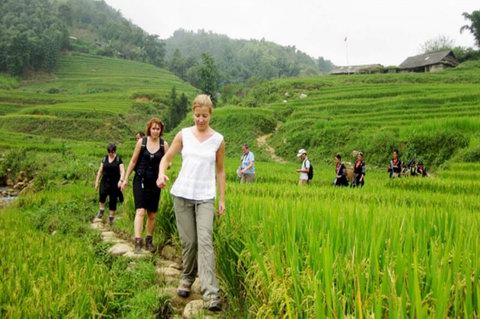|

Sapa, with
its stunning rice terraces, majestic mountains, and vibrant
ethnic minority cultures, is a popular destination in
Vietnam. The "best" time to visit largely depends on what
you want to experience:
1. For Golden Rice Terraces (Harvest Season):
• Late August to early October (especially September): This
is widely considered the most picturesque time. The rice
terraces turn a magnificent golden hue, creating
breathtaking landscapes perfect for photography. The weather
is generally pleasant, with cooler temperatures and less
rain.
2. For Green Rice Terraces & Blooming Flowers (Planting &
Spring):
• March to May (especially April and May): Spring transforms Sapa into a lush green paradise with blooming flowers. The
weather is mild, ranging from 10?C to 20?C, making it
excellent for trekking and outdoor activities. Farmers begin
planting rice seedlings in May, making the terraces a
vibrant green.
3. For Trekking & Hiking (Dry and Clear Skies):
• April to early June: The trails are typically dry and
easier to navigate, offering excellent views.
• September to early October: Similar to the golden rice
terrace season, this period also offers dry, clear
conditions ideal for trekking.
4. For a Refreshing Escape & Lush Greenery (Summer):
• June to August: Sapa offers a cooler escape from the
lowland heat. While it is the rainy season, the rainfall
contributes to incredibly lush green landscapes and makes
waterfalls particularly stunning. Temperatures are generally
pleasant, ranging from 17?C to 24?C. Be prepared for
occasional heavy downpours.
5. For a Unique Winter Experience (Chilly & Misty):
• December to February: This is the coldest time, with
temperatures ranging from 0?C to 10?C. You might experience
frost and mist, and occasionally even snow in higher areas
like Fansipan. It offers a unique, tranquil experience with
fewer crowds, and the chance to see snow in Vietnam is a
rare treat.
Summary by Season:
• Spring (March - May): Mild temperatures (10-20?C),
blooming flowers, lush green terraces (especially May with
rice planting). Good for trekking.
• Summer (June - August): Warmest temperatures (17-24?C),
lush green landscapes, heavier rainfall, waterfalls are
impressive. Can be crowded with domestic tourists.
• Autumn (September - November): Cooler temperatures
(15-20?C), less rain, clear skies. Best for golden rice
terraces (Sept-Oct) and photography. Excellent for trekking.
• Winter (December - February): Coldest temperatures
(0-10?C), misty, occasional snow. Quieter, but requires warm
clothing.
Important Considerations:
• Book in advance: Accommodation and transportation fill up
quickly during peak seasons (March-May and
September-November) and holidays.
• Pack appropriately: Regardless of the season, bring layers
as Sapa's weather can change rapidly, often experiencing
"four seasons in a day." Sturdy, waterproof trekking shoes
are highly recommended.
• Fog: Sapa can be quite foggy, especially during winter and
some parts of spring/autumn. While it adds a mystical charm,
it can sometimes obscure views.
Ultimately, the best time to visit Sapa depends on your
priorities, whether it's seeing the iconic golden rice
fields, enjoying pleasant trekking weather, or experiencing
a unique misty winter.
|